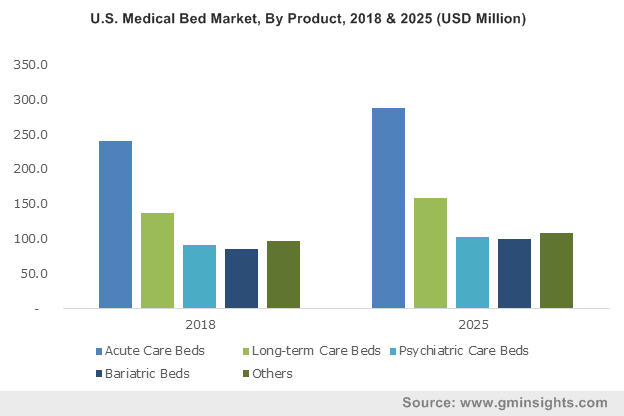Medical bed market to collect significant returns from hospitals by 2025, deployment of smart technologies in product manufacturing to impel the industry growth
Publisher : Fractovia | Published Date : 2019-06-04Request Sample
Medical bed market is likely to witness remarkable growth prospects over the forthcoming years, pertaining to the increasing awareness among medical practitioners to provide optimal care to patients by deploying effective and comfortable bedding systems. Comfort being one of the major concerns among the patients with regards to faster healing, most hospitals have been attempting to install extremely comfortable beds and related equipment, especially amidst the backdrop of innuendos that the lack of comfortable mattresses leads to loss of lives.
U.S. Medical Bed Market, By Product, 2018 & 2025 (USD Million)

Shortage of beds is also one of the major concerns among hospitals across the globe, which in consequence would provide major growth opportunities for medical bed industry players in the near future. For instance, several public hospitals of Saudi Arabia have been facing the problem of medical bed shortages for patients suffering from chronic diseases. In order to overcome this shortage, the government is investing heavily in the improvement of healthcare infrastructure.
The Saudi Arabian government has also planned Vision 2030 to enhance healthcare services by privatizing public hospitals. In fact, it has called upon many foreign and local investors to rationalize the healthcare spending under the National Transformation Program. Increasing governmental funding for the development of new medical centers, growing privatization, and numerous advancements in existing healthcare bedding systems are thus certain to push medical bed market share noticeably.
Medical bed market growth has been primarily influenced by the significant benefits of this product, a couple of which have been elaborated below:
- Side railings: Side rails are primarily provided to avoid accidental rolling out of patient from the bed. They also help patients get in and out of bed very easily.
- Height regulation: It is one of the notable benefits of medical beds as designed ability to raise and lower the height of the bed, which provides comfort and flexibility to patients and caregivers, thereby impacting medical bed market demand.
- Ease of moving: Owing to the incorporation of wheels, it is easier to move the bed from one location to other with less effort.
Undeniably, on account of its extensive advantages, hospitals and medical care centers have been giving preference to these beds. Indeed, hospitals are said to have accounted for a mammoth 65% of the overall medical bed market share in 2018, driven by the extensive number of surgical procedures which patients prefer to undergo in hospitals. In response, major participants in medical bed market have been striving to develop advanced and innovative beds in order to fulfill the surging product demand. The contribution of these companies, in the forthcoming years, will certainly propel medical bed industry size to greater heights.
The shifting trends toward adoption of smart technologies such as artificial intelligence and IoT have also impacted positively on medical bed industry outlook. In this regard, many of the medical equipment manufacturers are producing high perception medical beds comprising bed exit alarms, weighing systems, and connectivity facilities such as nurse call, which has led to the growing emergence of smart medical facilities across the globe.
For instance, China has taken an initiative to implement such innovative technologies primarily focusing on AI in smart medical care by 2018 mainly for gene inspection and interpretation of medical images in cancer diagnosis, which would considerably impact medical bed industry trends. Increasing prevalence of chronic diseases such as cancer, stroke, diabetes, and respiratory disorders mainly among the aging population will hereby impel medical bed market size. As per the Ministry of Civil Affairs of China, by 2025, the nation’s population beyond the age of 60 will comprise 21% of the overall populace. In consequence, to improve efficiency and reduce healthcare operating costs, the Chinese government has mandated the implementation of smart medical care facilities for hospitals, which has favorably propelled medical bed industry trends.
Considering the surging occurrence of heart-related problems pertaining to increasing obesity, well-known giants in medical bed market have been involved in strategic joint ventures with healthcare centers. For instance, recently, JFK Health, Inc. has merged with Hackensack Meridian Health in 2017 to improve patient experience & provide high-quality care. In addition, both the companies are looking forward to expanding their facilities in cardiac diagnosis.
With this merger, Hackensack Meridian Health has successfully increased its medical bed capacity by 4,520 units. The surging deployment of specialized treatment programs, outpatient and inpatient rehabilitation centers, and improved nursing facilities across private sectors are likely to augment the revenue scale of medical bed industry share. Many of the other players in medical bed market including Stryker Corporation, Paramount Bed, Getinge Group, and Hill-Rom Holdings have been bringing about new features in hospital beds such as electronic handling and zooming technology. In addition, it is noteworthy to mention that Stryker company has designed a new bed to minimize side rail gaps for reducing patient entrapment.
Apart from industry giants, several regulatory bodies such as FDA and WHO have also taken initiatives to minimize patient entrapment. For instance, recently, FDA introduced a new bill to mandate strict norms with regards to bed designing for all medical bed manufacturers. Aided by extensive government initiatives, coupled with massive product demand across major end-users, medical bed market is anticipated to chart out a profitable growth path in the years ahead.